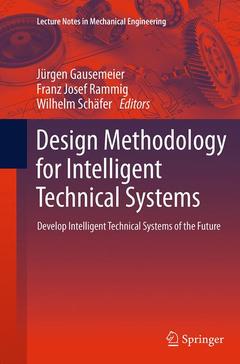Description
Design Methodology for Intelligent Technical Systems, 2014
Develop Intelligent Technical Systems of the Future
Lecture Notes in Mechanical Engineering Series
Coordinators: Gausemeier Jürgen, Rammig Franz Josef, Schäfer Wilhelm
Language: English
Subjects for Design Methodology for Intelligent Technical Systems:
Publication date: 08-2016
Support: Print on demand
Publication date: 02-2014
358 p. · 15.5x23.5 cm · Hardback
Description
/li>Contents
/li>Comment
/li>
Intelligent technical systems, which combine mechanical, electrical and software engineering with control engineering and advanced mathematics, go far beyond the state of the art in mechatronics and open up fascinating perspectives. Among these systems are so-called self-optimizing systems, which are able to adapt their behavior autonomously and flexibly to changing operating conditions. Self-optimizing systems create high value for example in terms of energy and resource efficiency as well as reliability.
The Collaborative Research Center 614 "Self-optimizing Concepts and Structures in Mechanical Engineering" pursued the long-term aim to open up the active paradigm of self-optimization for mechanical engineering and to enable others to develop self-optimizing systems.
This book is directed to researchers and practitioners alike. It provides a design methodology for the development of self-optimizing systems consisting of a reference process, methods, and tools. The reference process is divided into two phases the domain-spanning conceptual design and the domain-specific design and development. For the conceptual design a holistic approach is provided. Domain-specific methods and tools developed especially for the design and development of self-optimizing systems are described and illustrated by application examples. This book will enable the reader to identify the potential for self-optimization and to develop self-optimizing systems independently.




